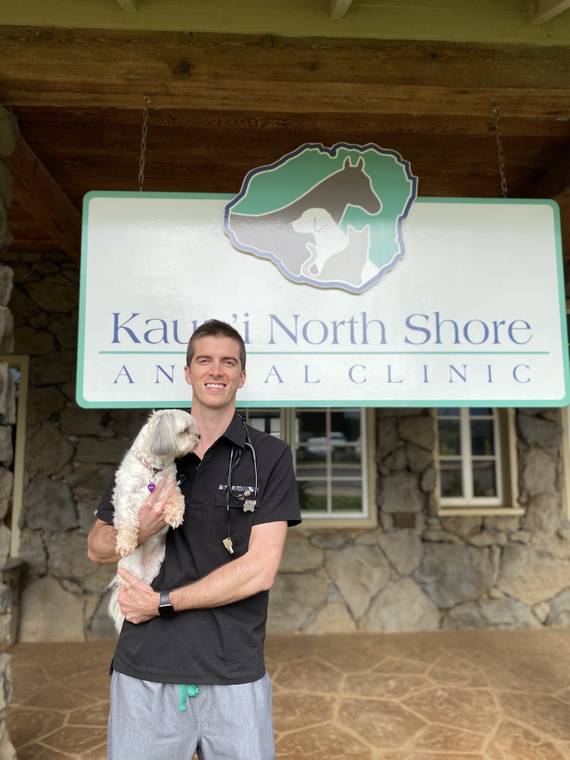KILAUEA — Ever wondered where to go or what to do if one of your pets is a possible COVID-19 carrier?
Kaua‘i North Shore Animal Clinic’s new veterinarian, Dr. James Oldeschulte, and Kaua‘i Human Society Executive Director Dr. Mirah Horowitz recently shared their advice.
Horowitz said it is important for people not to fear that their pets will give them COVID-19.
As the Centers for Disease Control and Prevention reports, a small number of pets worldwide, including cats and dogs, have been reported to be infected with the virus that causes COVID-19, mostly after close contact with people with COVID-19.
According to the Mayo Clinic, the virus that causes COVID-19 mainly spreads from person to person, and animals are not considered to be a significant way that coronavirus spreads.
“We recommend that you treat your pets as if they were people, and practice social distancing with your pets by keeping them at least 6 feet away from other people and animals outside your household, and staying at home when possible,” Horowitz said.
“If you believe your pet has spent time around a person infected with COVID-19, the best thing to do is to contact your veterinarian.
“If your veterinarian recommends a test and your pet tests positive for the virus that causes COVID-19, then that animal should be isolated from everyone else, including pets,” said Horowitz.
The few animal cases known to be infected globally have not all shown symptoms, and none have died, according to Horowitz.
“Your vet should help you determine when your pet is cleared of the virus,” Horowitz said. “It is not clear that pets have ever transmitted the virus to humans, but it does seem that humans can transmit to pets.”
Questions for the vet
What should I do if I think my pet or I have COVID-19?
“If you are in quarantine or if you have or are suspected to have COVID-19, don’t bring your pet into the vet yourself,” Oldeschulte said. “Call your veterinarian and find a friend to help facilitate the transport of your pet if your pet is exhibiting any sign of illness.”
Oldeschulte said anyone with COVID-19 should limit contact with pets, wear a face covering and wash hands often. If residents suspect their pet of having COVID-19, Oldeschulte shares the following CDC guidelines:
“Routine testing of animals for SARS-CoV-2 is not recommended,” CDC stated. “The decision to test an animal, including companion animals, livestock and wild or zoo animals, should be agreed upon using a One Health approach with the appropriate local, state and/or federal public-health and animal-health officials.”
Have you had any animals tested for COVID-19?
“We have not,” Oldeschulte said. “We work closely with IDEXX (Laboratories, a veterinary-services company), who has made a PCR (polymerase chain reaction) test for COVID-19 in pets. We routinely test unwell pets for more-common infectious diseases, respiratory diseases, heart diseases, and dental diseases and gastrointestinal disease.”
Oldeschulte advised having food, medications, supplies and an emergency kit for all pets, in case of a quarantine where no one will be able to leave the home for two weeks.
Safety measures at Kaua‘i North Shore Animal Clinic
The clinic, like other veterinarins on the island, is limiting face-to-face contact with pet parents while wearing masks and washing hands between patients.
“We kept our hospital clean prior to the pandemic, and have continued to clean surfaces before and after interactions with our patients,” Oldeschulte said.
Oldeschulte said natural infection is unlikely, but state animal-health officials would offer guidance.
Facts to share
Oldeschulte said it is much more likely your pet’s dental disease, not COVID-19, is likely causing upper-respiratory problems. Dental disease is one of the most-common health problems in dogs and cats, with reports of 70% to 90% of Kaua‘i pets affected.
“There is an association between annual veterinary dental cleaning and pets living longer, healthier, lives (20% longer),” Oldeschulte said. “Ask your veterinarian about a dental cleaning for your dog or cat.”
Some final thoughts
“I love dermatology, ophthalmology and emergency medicine,” Oldeschulte said. “There are no boarded specialists practicing on Kaua‘i. This makes it especially important for pet parents to develop relationships with their primary veterinarians and be proactive about wellness care, yearly visits and prompt evaluation for any changes noticed at home.”
Oldeschulte said if a pet has not had a wellness visit, including blood work, in the past year, pet parents should call their veterinarian to schedule an appointment.
“These are stressful times, and our pets pick up on that,” Oldeschulte said. “Stress is linked to GI (gastroenteritis) disease in dogs and bladder inflammation in cats. Let’s work together to keep our community mentally and physically healthy for the safety of our pets,” he said.
Oldeschulte of the Kaua‘i North Shore Animal Clinic in Kilauea moved to the island around a month ago from Maui, and is an alumnus of the Texas A&M College of Veterinary Medicine. In his off time, he loves staying connected with specialists on the mainland and attending veterinary continuing-education events to provide the best and most current guidance for pet parents on Kaua‘i, he said.
The CDC has a document on its website of recommendations for animal SARS-CoV-2 testing given limited resources, cdc.gov/coronavirus/2019-ncov/animals/animal-testing.html.
The CDC said veterinarians are strongly encouraged to rule out other, more-common causes of illness in animals before considering SARS-COV-2 testing.
Finally, the CDC states pets are not easily infected with SARS-CoV-2, and the U.S. Department of Agriculture is tracking confirmed cases of it in animals in the U.S. aphis.usda.gov/aphis/ourfocus/animalhealth/saonehealth/sars-cov-2-animals-us.
•••
Stephanie Shinno, features, education, business, and community reporter, can be reached at 245-0424 or sshinno@thegardenisland.com.



